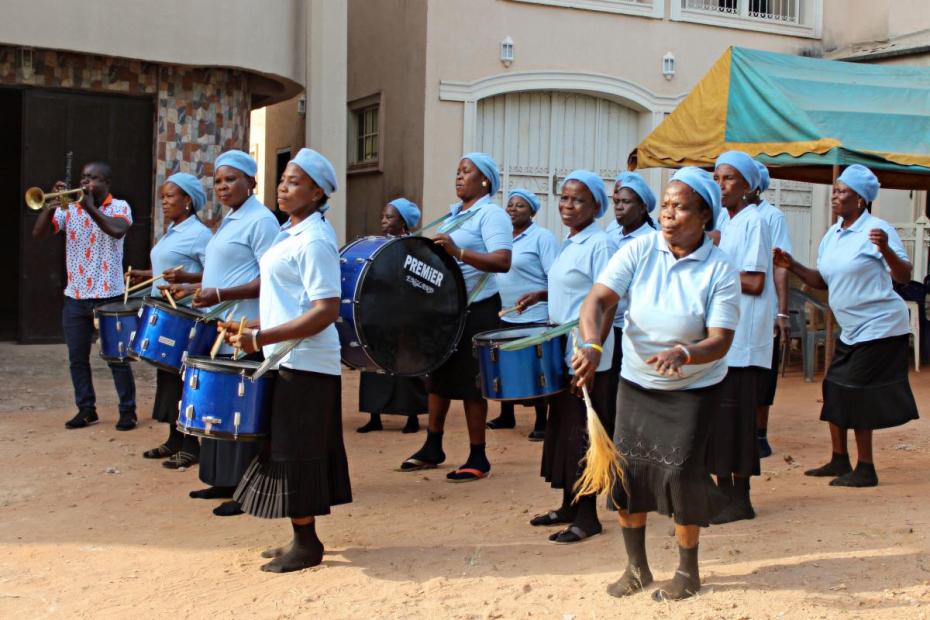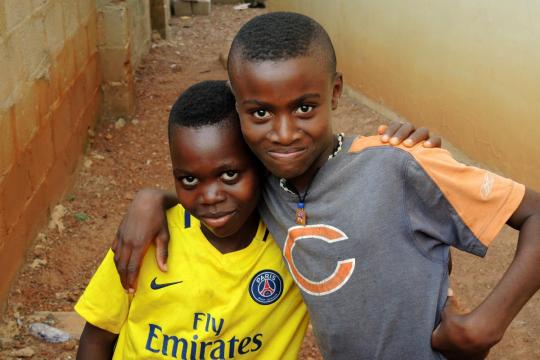According to Igbo tradition, funerals are huge—by the financial standards of most families, extravagant—and highly ritualized events. Modernization and the advent of Christianity have done little to change that. Funerals are an occasion when two worldviews, traditional and Catholic, often play out together. Whereas Catholics in many cultures hold funerals on any day but Sunday, in modern Igboland, Friday is the normal day for memorializing and burying the dead. That arrangement is possible because a funeral is not meant to happen quickly. It takes a great deal of planning and requires significant financial resources.
In the traditional Igbo context, funerals are understood in particular as rites of initiation—an initiation into the community of ancestors, conferring on the deceased all the privileges and responsibilities that the ancestors have relative to the living.1 Death is undoubtedly a “calamity,” and also a passage to the spiritual realm.2 Transfer into the realm of the ancestors is not automatic. Some of the deceased do not merit it, and are condemned to wander as spirits who cannot reincarnate.3 For those who do merit joining the realm of the ancestors, funeral rituals are necessary to initiate that transition. Failure of the living to honor the dead means baneful consequences for the living because it consigns their forebears to be among the wandering, malicious spirits, not the potentially helpful ancestors. As Austin Echema, an Igbo priest and scholar puts it, “The goal of life is to become an ancestor after death.”4 Lack of a funeral impedes that goal.
Like other aspects of traditional Igbo culture, the particularities of the traditional rituals vary significantly from village to village, but broad patterns can be noted here.
Casual visitors might not have reason to notice it, but Enugu is a city without cemeteries, except one for priests. Furthermore, tradition dictates that for most urban dwellers in cities like Enugu, the funeral would not take place in a person’s “home” parish, the one where he lives in the city. That all happens back in his real home, his ancestral village. “When a person dies, you must carry his body to the village. People are usually buried there unless they are people whose natal village is in present-day Enugu,” recounted one man. Children, too, even if they are born in Enugu, belong to the father’s ancestral village and are normally brought there to be buried. A married woman’s body is not buried with her husband, in his village, except in rare circumstances. She is a daughter of her own village, and is buried there.
Even in the villages, there are no big cemeteries. “In the family compound, the family digs a hole six feet deep. Sometimes they mark it, other times no. The body disappears quickly in the ground here.” “In the family compound” can mean that bodies are buried beneath the floor of the house. Traditional Igbo beliefs say that the ancestors are always present among the living, and the choice of burial places reinforces that.
But there is plenty to be done and planned before that burial: enough that the burial might actually be delayed months, while the body is left in storage at a morgue. “Sometimes it takes six months for people to prepare. The bishop says that people must be buried within one month of death, so some people deposit the body in the mortuary and keep quiet about the death” while they quietly consolidate funds and plan.5
Members of the extended family must be informed in a proper manner, traditionally by in-person visits. One man recounts, “You have to plan to be able to house and feed the mourners who come to the village, many from afar: inlaws, friends, a huge flow of people, and you must care for them. You must feed all of them… You might form a committee of friends to help you plan… the venue, hiring canopies [coverings to protect the seated guests from sun or rain]... cooking food, drinks [palm wine]... uniforms [for family members—these could range from matching traditional wrappers to polo shirts imprinted with a picture of the dead], memorial souvenirs, a renovation of the house to make it beautiful enough for the display of the body. It’s much too expensive.” Around Enugu and at junctions nearby, one often even sees billboards announcing a death and funeral. The whole lineage, plus village and other friends, should be there to grieve. Ikwuemesi and Onwuegbuna describe the uniformity of attire among key mourners as “a mark of solidarity with both the dead and the survivors.” 6
The funeral Mass is typically at 10 a.m. on a Friday. In the past, it might have been celebrated in the family compound, but today it is expected to be at the church. Afterwards, the priest follows the body in procession down to the family compound and blesses the grave. “You bury and cover it with dirt, and the priest usually leaves by noon. Then there is a lot of singing, dancing, eating until the evening. You have to invite traditional bands—two, three, four groups to play, depending on your pockets. There has to be plenty of food for the people who come, or it would be insulting to them.”
The style of the ritual after the priest leaves—how much it incorporates local traditional customs—varies according to the disposition of the family. Traditional elements include dusk-to-dawn wakes soon after the death; gunshots in the air; dances by masquerade figures and mourners; kola nut rituals; poetry and song; shaving of husband or wife’s head; sacrifice of chickens, cows and dogs; drinking; preparation of certain foods and other items to symbolically carry the dead to the next world; and a ritual known as Ikwa Ozu, “second burial.”7 For many Catholics, religious elements deemed theologically objectionable can often be eliminated or ostensibly stripped of traditional theological meaning. With the advent of the mortuary, the initial and “second burial” rituals have generally been conflated into a single event.
Watch video
Extended videos of Igbo Catholic funerals are found online:
- Late Iyeri Gold Catholic Funeral Rites in Igbo land
- The Funeral Ceremony of Catechist Josiah Ogbonna
- Some traditional elements of an Enugu funeral
- Enugu Masquerades at a Traditional Burial
The traditional ceremony is a big celebration of life, as colorful as it is sorrowful. One Igbo theologian critiques them for having become “popular social events,”8 but others discount this perspective: “A non-Igbo who takes a superficial view of Igbo funerals would easily decry their characteristic fanfare and boisterous atmosphere. However, their purpose is not to discount or devalue the gravity of death, but to turn death, grief and mourning into a democratic experience shared by the dead, the bereaved and the community at large—a collective denial of the finality of death.”9
A priest reported that if he knows the person who has died, his preaching is expected to be first about the Christian meaning of death, and then about the person’s life. “And you are expected to talk only about the good things, to ignore the bad things. You promote his good deeds. You might talk about what a good life is, and can say what it takes to avoid a bad life,” only obliquely referencing the bad qualities by exhorting the living away from those faults.
On the Sunday after the funeral, people typically come to church to a thanksgiving Mass for the life of the person. After six months or so, many families hold a memorial service, an adapted, or entirely Christianized take on the traditional Ikwa Ozu. For others, it has become fashionable to organize a memorial a month after the burial.
Some Igbo are critical of the expensive burden this puts on a family. People often have to sell land in order to bury the dead. Some politicians and bishops have tried to mandate less expensive forms of memorial, but these have so far been undermined or circumvented. Living up to broader cultural pressures remains an insurmountable pressure for many. Echema laments, “Some families who cannot afford enough money to bury their dead in a way that measures up to public expectation lose public esteem and are sometimes derided and laughed at. Others... exhaust their family resources and even incur very heavy debts… Yet, some other families use the occasion of burial as an opportunity to display their affluence and wealth.”10 One serious Catholic indicated that such rules may be well intentioned, but that it was inevitable people expected and needed to be fed if they traveled for a long funeral.
The cost and duration of the funeral depends on the status of the person who dies. Funerals are a way to honor and celebrate the achievement of an adult, and there is more to honor and celebrate as people have passed certain life stages or received certain titles. If a child dies, the funeral is much simpler. “If a child dies, you just gather and bury the child without much ceremony. But adults, much celebration.” That standard would hold for almost anyone not yet married and therefore not yet been able to achieve a full place in society.
- 1George Nnaemeka Oranekwu, The Significant Role of Initiation in the Traditional Igbo Culture and Religion: An Inculturation Basis for Pastoral Catechesis of Christian Initiation (Frankfurt: IKO Verlag, 2004), 94.
- 2Chuu Krydz Ikwuemesi and Ikenna Emmanuel Onwuegbuna, “Creativity in Calamity: Igbo funeral as interface of visuality and performance,” Continuum 32, no. 2 (2018): 184-200.
- 3For a list of the many reasons that might prevent a person from becoming an ancestor, Austin Echema, Igbo Funeral Rites Today: Anthropological and Theological Perspectives (Munster: LIT Verlag/Piscataway: Transaction, 2010), 25.
- 4Echema, Igbo Funeral Rites Today, 1.
- 5Echema cites a number of rules that some Igbo dioceses have adapted to curb funeral practices for reasons of health and hygiene, or concern over immiseration from excessive expense, or for reasons deemed superstitious. These include not only admonitions on many traditional elements but moderation in terms of contemporary elements like caskets. Echema, Igbo Funeral Rites Today, 60-66.
- 6Ikwuemesi and Onwuegbuna, “Creativity in Calamity," 197.
- 7 The gunshots have served to both announce the event to the living and the dead, and to drive away malignant spirits. For a much fuller account of what the traditional Igbo rituals entail, depending on the gender and status of the deceased, see Echema, Igbo Funeral Rites Today, 29-45. On music, dance and poetry at traditional and Christian-traditional funerals, see Ikwuemesi and Onwuegbuna, "Creativity in Calamity," 191-194.
- 8Echema, Igbo Funeral Rites Today, 55.
- 9Ikwuemesi and Onwuegbuna, "Creativity in Calamity," 195.
- 10Echema, Igbo Funeral Rites Today, 60.

